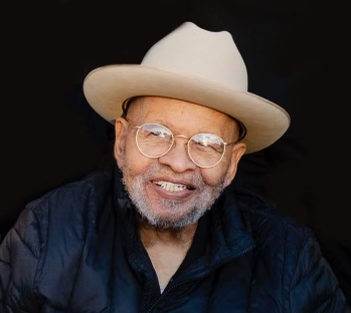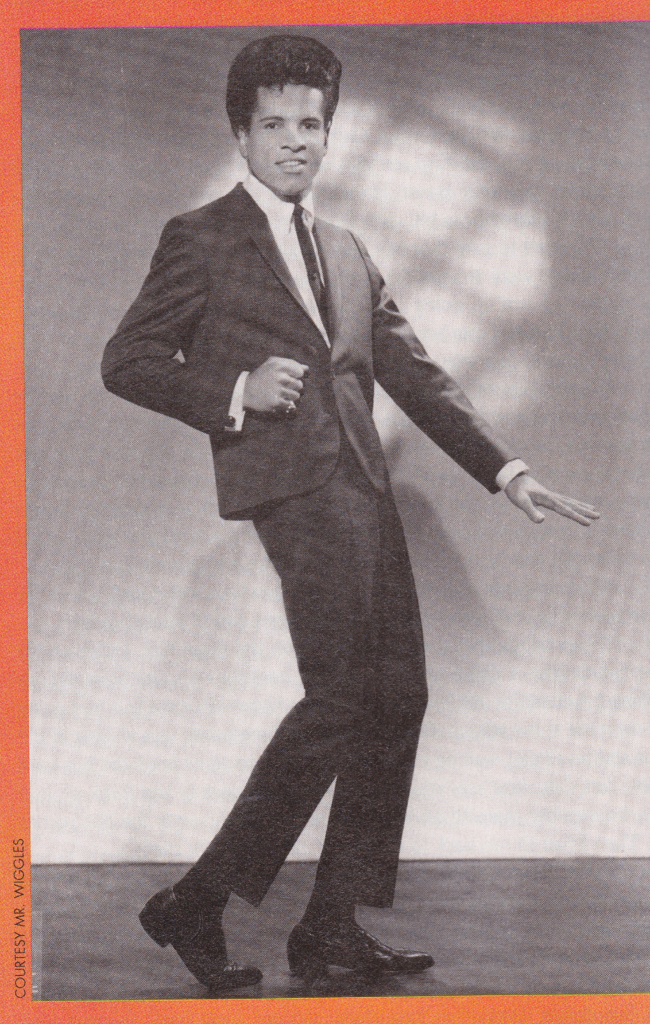
On July 12, 2023 we lost our dear friend and collaborator, August Moon. What follows is a personal account from Secret Stash founder, Eric Foss…
No need to sugar coat it one bit. When August Moon (or as he was lovingly referred to by those who knew him, just “Moon”) and I first met, we didn’t exactly get along. He was an aggressive businessman from a bygone era, and I’m a somewhat laid back midwestern millennial. I guess that’s what made our eventual close friendship and long, fruitful working relationship all the more special.
In the Summer of 2013 we reissued the “Free Angela” compilation, a collection of recordings produced by Moon in the 60s and early 70s. We also pressed some limited edition 45s from his catalog. You’d think things would end there. However Moon just kinda never went away. He kept in touch and a relationship grew. In 2017 we reached an agreement that made Secret Stash the administrator of his film, tv, and commercial licensing rights. Together we helped his catalog reach new audiences via placements in world renowned films, TV shows, and advertising campaigns.
By 2019 I was literally on the phone with Moon twice a day most days. We spent countless hours small talking; weather (MN is very different than VA), sports (long live King James), and politics (he loved to push my buttons by calling politicians I didn’t like “your boy”). When my family would come to visit he’d always tell me to let them all know he says hello. When my wife was pregnant he was constantly checking to see how she was doing. When I caught Covid-19 he kept tabs on my health. He was also someone I could come to for business advice.
In addition to having an incredible ear for music, he was as sharp a businessman one could ever encounter. At a time when black artists were being taken advantage of as a matter of regular practice in the record business, Moon set up his own labels and publishing companies to maintain ownership of his music, and the music he produced. He never lost that independent streak, and always kept a tight grip on his most treasured asset, his music copyrights. He retained 100% ownership of them right up until the end, and even had the foresight to properly pass down ownership to his wife in his last will and testament. That may not sound like a big deal, but you’d be shocked how many people don’t take the time to do this. As a new father and owner of many copyrights, I’ll just say I took note.
The only thing Moon loved more than music was his family. I’ve been blessed to get to know his wife (who now owns the catalog) and two of his daughters, whom he was immensely proud of (rightfully so).
If you’ve made it this far, I just wanna say thanks for reading. Writing this was cathartic to say the least. Anyhow, that’s enough from me. Keep an eye out for more August Moon related releases from us in the near future. In the meantime, here are some of the liner notes written by our own Will Gilbert in 2013 for the Free Angela reissue. It includes a lot more detailed information about Moon and his work.

…….
Alexander Randolph, Mr. Wiggles, Ray Curtis, Dickie Diamond, and August Moon were all born in Richmond, Virginia on August 7, 1937. Years of performing, booking and promoting concerts, and running record labels led Mr. Randolph to use each of those pseudonyms. In addition, work took him all over the country, with large parts of his life spent in Richmond, New York City, Baltimore, Washington D.C., Chicago, Georgia, Alabama, and California.
The aura of entertainment captivated Randolph early on. His first musical memories began at age 12, learning Louis Jordan songs from the jukebox and entering talent contests at Gregory’s Ballroom in Richmond. Later, he honed his skills as a performer in Newark, New Jersey by singing at Ben’s Cotton Club. By the end of the 1950s, he had taken on the stage name “Mr. Wiggles.” As Mr. Wiggles, Randolph made a living traveling up and down the East Coast selling novelties at concerts. He learned songs by Chuck Berry, Little Richard, and Fats Domino and became friendly with the house bands for these concerts. Once he was tight with a band, he made sure he was first on stage for the show, then ran through his routine. Afterward, he went to the lobby and set up his merchandise. As long as the crowd recognized him as a performer, they would stop by his table and possibly buy some of his wares. Often, the merchandise he sold came from framing publicity photos of musicians, or affixing photos to hats. Goals once directed toward life as an entertainer veered toward a career on the business side of music and over time his chief inspiration changed from Louis Jordan to Berry Gordy, Jr.
During the early 1960s, Randolph began nurturing his fledgling interest in music business by getting to know musicians, managers, booking agents, and promoters. He met and learned from people like Henry Wynn (owner of Supersonic Attractions and The Royal Peacock club in Atlanta, Georgia), Teddy Powell (a promoter in the New York area), Henry Nash (road manager for Little Richard and The Upsetters), Jack “The Rapper” Gibson (promotions man for Motown and former DJ at WERD in Atlanta), and Dave Clark (promotions man for Don Robey’s Duke and Peacock labels). In addition, he spent time working with Universal Attractions out of New York. These jobs and experiences helped refine Randolph’s career interests.
In 1964, Randolph began the transition from performer to recording artist and record label owner. He learned from promoters that radio disc jockeys were less likely to play two songs from the same artist or label, than play one song each from two different labels or artists. He also learned the importance of owning your own publishing. Early on, Randolph began relabeling artists with different names, as well as releasing material on multiple labels. He recorded under the name Mr. Wiggles for Cameo-Parkway, in addition to issuing records on seven of his own labels: Fat Back Recordings, Golden Triangle, Hemisphere, Raven, Soul International, Sound of Soul, and Sprite. The lion’s share of his releases were either written or co-written by him, and all were under his publishing company. Mr. Wiggles also had his own one-stop distribution company, Sound of Soul Distribution, and his own record store and nightclub in Richmond.
Randolph has lived off and on for much of his life in New York City. And before it closed in 1966, he lived at the Theresa Hotel on 125th St. & 7th Ave. Located just down the street from The Apollo in the heart of Harlem, the Theresa Hotel was a center for the black community. In Harlem, Randolph drove sales of his releases by selling copies from the trunk of his car. One of his biggest sellers was his own song, “Home Boy.”
By 1967, after working on many records together, Alexander Randolph and Tyrone “Little Tommy” Thomas got into a series of disagreements and took a break from collaborating. Randolph’s labels went on hiatus for a few years, while he called upon his experiences working for others in booking and promotions to start his own company, Capitol City Attractions in Trenton, New Jersey. Going by the name Dickie Diamond, he booked acts like The Jackson 5, Sly and The Family Stone, The Dells, The Delfonics, Kool and The Gang, The Moments, and Patti Labelle and The Bluebelles. It was through promoting shows in the late 1960s that Randolph met Larry Sanders in Mobile, Alabama. By then, southern soul and the sounds of Stax, American, Fame, and Muscle Shoals Sound Studios had captured the attention of Randolph. Larry Sanders and Randolph began by doing sessions at Fame and Muscle Shoals Sound around 1970.
By the end of the 1960s, Patti Labelle and The Bluebelles consisted of Patricia Holte, aka Patti Labelle, Sarah Dash, and Nona Hendryx. Patti was born in Philadelphia, while Sarah and Nona were born in Trenton, New Jersey. Trenton and Philadelphia are so close to each other, it makes sense that for a spell during 1969 and 1970, Diamond’s Trenton based managed Patti Labelle and The Bluebelles. Another act he managed was a hard rock trio from Trenton called Sainte Anthony’s Fyre. Bob Sharples, drummer for Sainte Anthony’s Fyre, fondly recalls stopping by Randolph’s office and taking Labelle’s dogs for walks while she and Randolph discussed business. During this time, Sharples’ band opened shows for Labelle’s group and many other R&B acts. They also backed Patti Labelle & The Bluebelles in the studio in exchange for getting their own recording time. Sharples vividly remembers Randolph’s driver taking them in his old Rolls Royce from Trenton to Times Square in New York to record at CBS Studios for those sessions. Around this time, Randolph and Tyrone Thomas reunited. Tyrone was in a group called Brother Love and Randolph needed a backing band for Patti Labelle and The Bluebelles. So, Tyrone helped put together the band Nobody’s Children.
In addition to being an entrepreneur, Alexander Randolph has been an activist for much of his life. He was part of a march organized in the aftermath of the September 15, 1963 bombing that killed four girls at the 16th Street Baptist Church in Birmingham, Alabama. He knew of Angela Davis, who grew up in Birmingham, and when she came to national attention, first for being fired from her position at UCLA, and then for being on the FBI’s Most Wanted List, he felt compelled to help raise money for her defense. Free Angela was conceived in late 1970, and released with fifty percent of the proceeds going to the Free Angela Davis Committee.
After a forced break in activity from approximately 1972 through 1976, August Moon released another series of records, then in the 1980s and 1990s he recorded hip hop at his own studio in Richmond. For years he has been heavily involved in charities and politics. A stroke and aneurysm on January 8, 1998 left Mr. Moon in a wheelchair and made it more difficult to speak, but has not slowed his spirit or energy.
-Will Gilbert, 2013
…….
